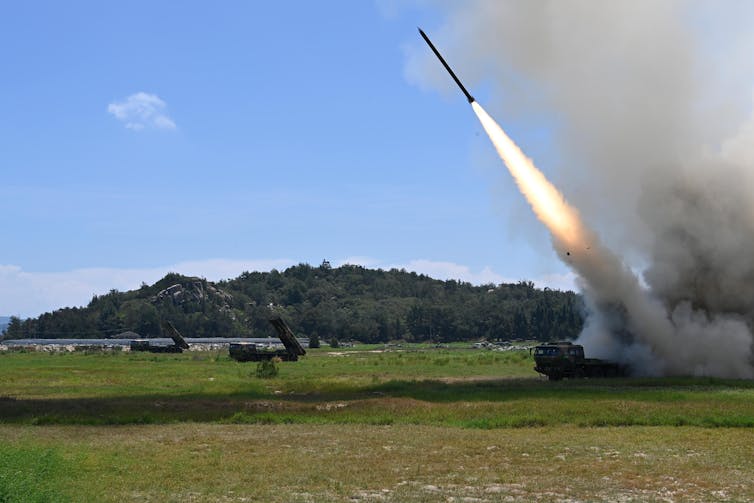In his new 12 months deal with, Chinese language president Xi Jinping claimed that Taiwan would “absolutely be reunified” with China. In opposition to the backdrop of elevated Chinese language navy posturing within the Taiwan Strait, some western journalists are framing Xi’s remarks as an overt and direct menace towards Taiwan. They argue that Xi’s rhetoric validates considerations a couple of potential invasion.
This framing misses the purpose and overlooks the home political context of Xi’s speech. Xi additionally celebrated the successes of the Chinese language nation and financial system, whereas acknowledging the financial struggles of the Chinese language folks. Somewhat than threatening Taiwan, this rhetoric is meant to guard Xi’s regime.
Western governments draw their legitimacy from a preferred mandate, which is established by way of elections. The legitimacy of the Chinese language Communist Occasion (CCP) to manipulate China can also be premised on a mandate. However as a substitute of by way of elections, this mandate is established by way of the celebration’s report on making certain continued financial prosperity and nationwide success.
On this context, Xi’s emphasis on financial progress and the nation ought to be thought of performative – an instance of political theatre portraying the CCP in a rigorously curated method for a Chinese language viewers.
Following the Cultural Revolution (which had disastrous penalties for China’s folks and financial system) and Mao’s demise in 1976, the CCP re-established its legitimacy on twin pillars of financial prosperity and nationalism.
Former chief Deng Xiaoping secured the financial pillar within the Eighties by way of reforms that raised 800 million folks out of poverty. The nationalist pillar concerned retelling Chinese language historical past. The regime emphasised historic achievements, commemorated nationwide struggles and portrayed the CCP because the vanguard of the Chinese language nation.
Underneath Mao, Japan’s invasion of China within the second Sino-Japanese struggle (the Chinese language theatre of the second world struggle) was offered as an ideological class wrestle. In response to this narrative, each Chinese language and Japanese employees have been exploited by militaristic bourgeois elites. These days, China’s nationalist narrative presents Japan as a international oppressor that China heroically resisted and overcame underneath the CCP’s management.
Such narratives of Chinese language historical past have resulted in a up to date Chinese language nationalism delicate to what it considers renewed victimisation of the Chinese language nation. This contains worldwide opposition to reunification with Taiwan, a historic province of China.
Counting on nationalism
As China’s financial system slows, the CCP has develop into more and more reliant on the nationalist pillar to retain its legitimacy. This limits the CCP’s choices in nationalistic disputes because it should act in such a method that upholds its nationalist credentials.
In 2005, China noticed massive anti-Japanese protests triggered by Japan’s downplaying of the atrocities it dedicated throughout its invasion of China. Throughout the context of 11.4% financial progress, the CCP shut down public transport to dam protesters from arriving within the largest cities and officers condemned the protests.
However, by 2012, China’s financial progress had slowed to 7.9%. And the CCP was notably silent throughout equally massive anti-Japanese protests over the Senkaku Islands (generally known as the Diaoyu Islands in China) – a territorial dispute within the East China Sea related to the second Sino-Japanese struggle.
China’s nationalist motion criticised the CCP for being too delicate on Japan, prompting then vice-president Xi to publicly surrender Japan’s territorial declare. This constitutes a performative acquiescence to nationalist strain, with Xi performing to safe the nationalist pillar whereas the financial pillar faltered.

BBBar / Alamy Inventory Picture
Understanding Xi’s efficiency
Xi’s point out of nationwide reunification with Taiwan in his new 12 months deal with is in step with the CCP’s elevated reliance on nationalism to safe legitimacy as China’s financial system slows.
This could additionally clarify China’s posturing within the Taiwan Strait. China skilled 3% financial progress in 2022, the bottom progress fee since Deng’s reforms (excluding the peak of the COVID pandemic). So to deflect scrutiny, the CCP is intensifying its embrace of brinkmanship within the Taiwan Strait.
Finally, this brinkmanship is unlikely to culminate in a struggle contemplating how an invasion might backfire on the CCP. Within the occasion of an unsuccessful invasion, the CCP would undergo vital harm to its repute. Even a profitable however extended battle with heavy losses would have the same impact.
Both method, the near-certain financial penalties, comparable to sanctions and embargoes, would topple the celebration’s financial pillar.
Learn extra:
Taiwan: how the ‘porcupine doctrine’ would possibly assist deter armed battle with China

Xinhua / Alamy Inventory Picture
Acknowledging financial shortcomings
Extra attention-grabbing than Xi’s speak of reunification is his admission of the financial struggles of the Chinese language folks. In his deal with, Xi defined that “some folks had issue discovering jobs and assembly fundamental wants”.
There’s little or no precedent for acknowledging the shortcomings of the CCP’s supply of financial prosperity. Doing so contradicts the financial pillar. It’s notably odd on condition that the CCP has just lately suppressed adverse commentaries on China’s financial system to keep away from damaging public confidence in its financial stewardship.
As brinkmanship within the Taiwan Strait reaches its limits, it appears the CCP is shifting away from an over-dependence on the nationalist pillar. As a substitute, it could be pursuing a much less instantly dangerous technique, acknowledging present financial points whereas emphasising the potential for financial progress underneath the CCP. This strategy could be a safer option to preserve the celebration’s legitimacy than escalating tensions within the Taiwan Strait.
Xi’s speech signifies a altering nuance in CCP discourse – one which will develop into more and more obvious over the course of the approaching 12 months.



